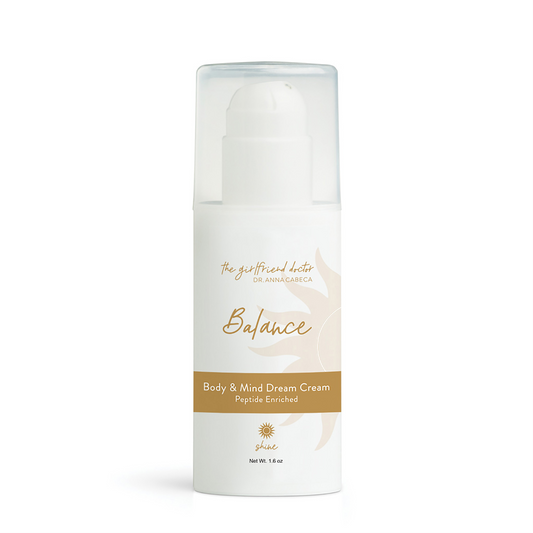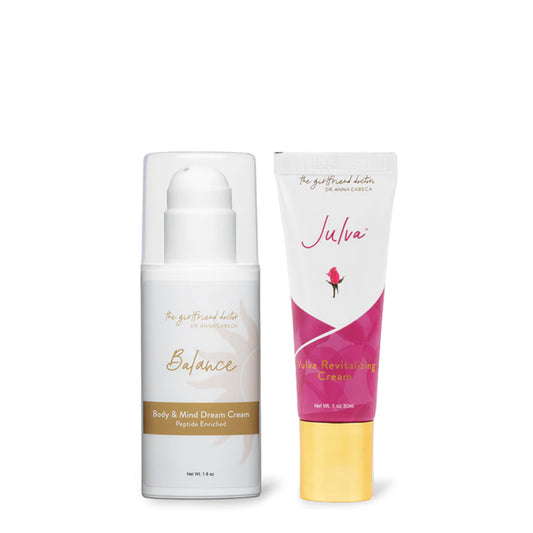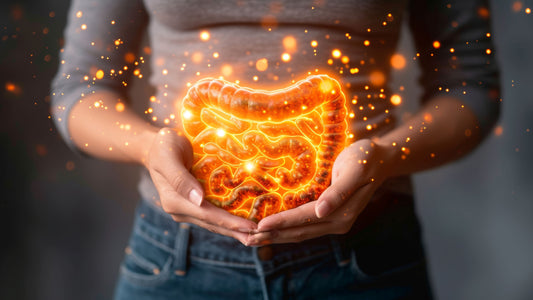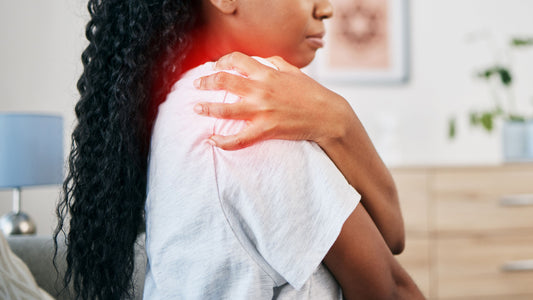Turn up the air conditioning! Is it hot in here or is it just me?
Well, it just so happens awhile ago at my hairdresser’s, it was just me — experiencing a hot flash! Right in the middle of getting my hair done, my face and chest flushed, I got so hot I started sweating and I had to ask my hairdresser to stop because it was almost unbearable. Probably one of the worst hot flashes I had experienced at the time!
 Of course, I had to stop and get it all on my camera so I could share the experience with you (check out the video below). I was lucky that I happened to be at a fairly “safe space” when mine hit, but I can also imagine this experience can seem embarrassing if it happens during a meeting with a client, a presentation or other professional settings.
Of course, I had to stop and get it all on my camera so I could share the experience with you (check out the video below). I was lucky that I happened to be at a fairly “safe space” when mine hit, but I can also imagine this experience can seem embarrassing if it happens during a meeting with a client, a presentation or other professional settings.
So I feel for you ladies out there who might not be so lucky. Hot flashes are very uncomfortable, can seem embarrassing if they strike at inappropriate moments, and can really mess with your self-esteem.
I thought I’d answer some frequently asked questions about hot flashes for you. As I always say, knowledge is power. And with knowledge, you will be able to make informed decisions for yourself.
Let’s look at some of the most common questions I’m asked about hot flashes:
- What are hot flashes?
- What causes hot flashes?
- How long do I have to go through this?
- What triggers hot flashes?
- What does a hot flash feel like?
- How can I prevent hot flashes?
What Are Hot Flashes?
Hot Flashes are a sudden feeling of intense heat, usually concentrated around the face, neck and chest area, that typically occurs in around 80% of perimenopausal and menopausal women.
Your skin might flush, you might start sweating, experience rapid heart rate, anxiety, and even chills while it is happening. It can last from anywhere from 30 seconds to 30 minutes!
If they occur during sleep, it can result in drenching sweat, making it difficult for many women to get a good night’s rest. Overall, the feeling is described as uncomfortable to very uncomfortable and overwhelming, depending on the severity and length of the hot flash.
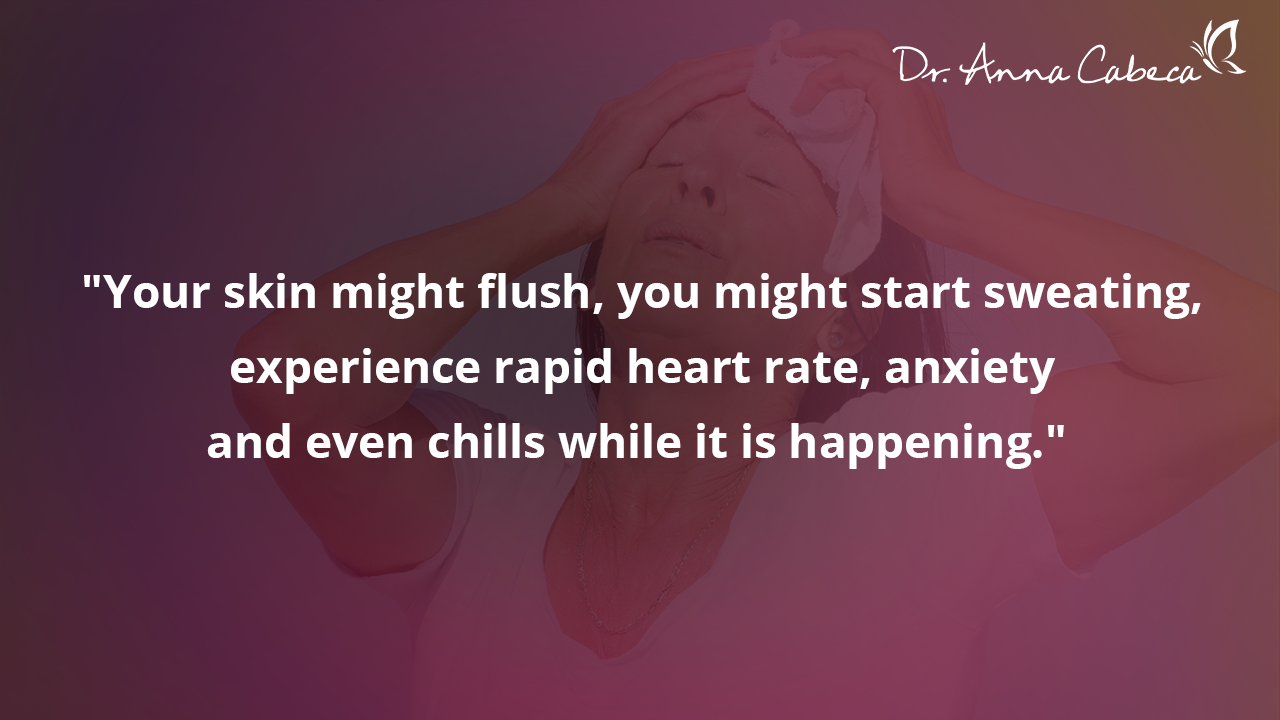
Hot flashes are associated with that hormonal roller coaster that accompanies the end of a woman's childbearing years. But hormones alone can't explain why some women experience severe hot flashes while others don't.
What Does A Hot Flash Feel Like?
The short answer is that it is a feeling of intense heat that often comes without warning and can last from 30 seconds to 30 minutes (sometimes even longer!).
Some women report feelings of anxiety either during or just before a hot flash. Some experience rapid heart rate, flushed face, neck and chest, and profuse sweating because the body is trying to cool itself down from the sudden intense heat.
It isn’t uncommon that a woman may feel like stripping off her clothes to cool down! Some women even experience nausea and lightheadedness. And let’s not forget night sweats, where one minute we’re too hot and the next minute we’re freezing.
All in all, it’s quite a miserable experience that can leave us feeling defeated. Hot flashes can impact the quality of our lives. They can cause embarrassment (imagine experiencing one at work!) and they can make sleep challenging.
What Causes Hot Flashes?
If hormones can’t fully explain hot flashes, then what does cause it? Here’s the thing — we’re not entirely sure yet. Some researchers believe that the decline in estrogen levels that happens as our bodies go from fertile to infertile is the main culprit. The truth is that we can’t say for sure why hot flashes happen.
What researchers from the SWAN study (a study spanning 17 years) did find was that lifestyle and ethnicity played a part in the length and severity of the experience. Women who experienced hot flashes for longer durations tended to be:
- Smokers
- Overweight
- Stressed (or perceived to be under stress)
- Depressed
- Anxious
The study also showed that African American women tended to experience longer periods of hot flash symptoms — almost double that of Chinese and Japanese women. Though hot flash causes are not limited to just lifestyle and ethnicity either.
While the current thinking is that hot flashes are caused by a combination of things including hormone decline, lifestyle and ethnicity; researchers do agree on one thing, hot flashes will eventually go away.
How Long Do I Have To Go Through This?
Yes, hot flashes eventually go away — on their own. Yes! That's the good news. So it is possible to just grit it out, and some women who experience mild symptoms often do. But if you’re not one of these women, why suffer when there are ways to prevent it, am I right?
Now, the bad news.
The bad news is that sometimes hot flashes can last for years after menopause — some women clock in at 11 years of hot flashes! The stress of just thinking about that is giving me a hot flash right now!
The SWAN researchers found that when women got their first hot flash, was a key indicator as to how long hot flashes would last overall. Women who experienced hot flashes before their menstrual period ended were more likely to have hot flashes that lasted nine to 10 years.
Women who had their initial hot flashes after their periods completely ended were found to have fewer years of symptoms, the average being three years. Still, that's a long time to be dealing with sleep disruptions, night sweats, and other discomforts!
What Triggers Hot Flashes?
Another important aspect of how you will experience hot flashes is going to be what triggers YOUR hot flashes. Every woman has different triggers, but we know from the research that one of the most common triggers is STRESS.
Ah yes, stress seems to be the culprit causing so many disruptions in our bodies.
I routinely talk to clients about stress, and the need for women to focus on reducing it versus powering through it, for both our physical and mental health!
Cortisol, our stress hormone, is key to how we experience menopause since it affects our overall levels of inflammation and our body’s ability to remain insulin sensitive.
In fact, cortisol is so important that I would say it might have a bigger role to play in causing menopausal symptoms than estrogen, progesterone, and testosterone.
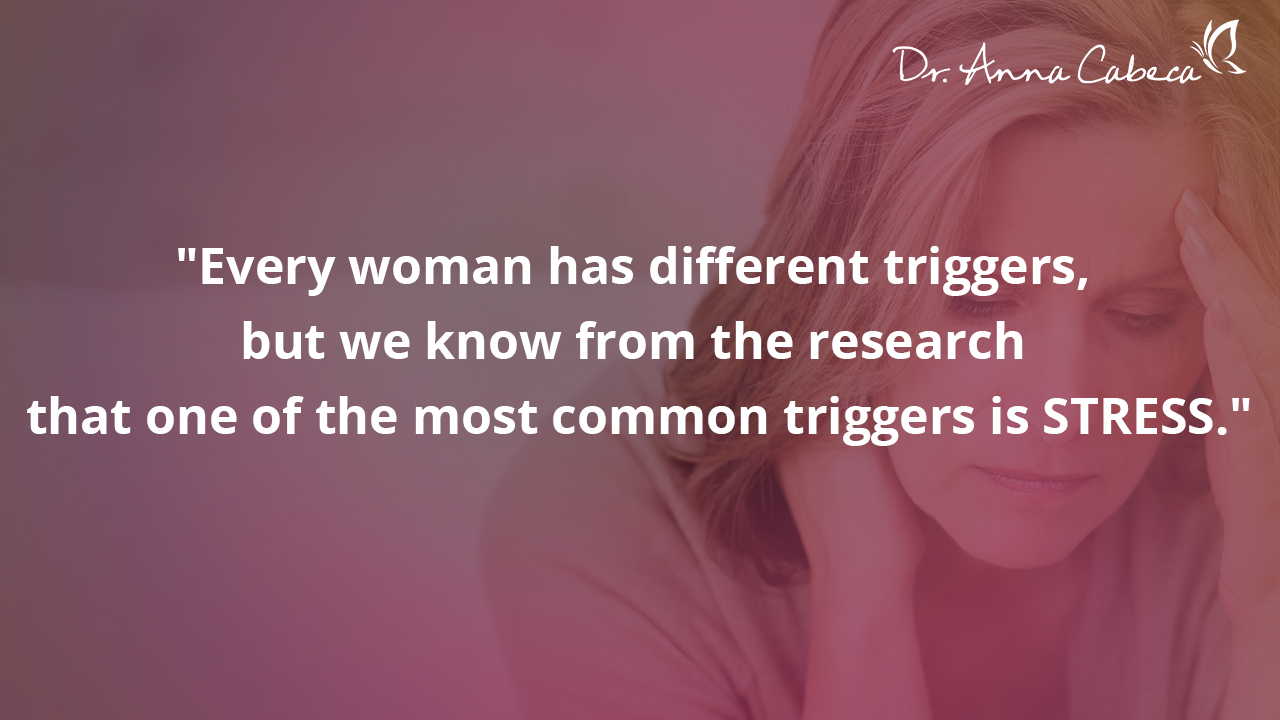
Other typical hot flash triggers include:
- Caffeine
- Alcohol
- Food sensitivities (such as dairy, sugar, and gluten)
- Refined, processed food (such as white bread, chips, and sweets)
- Warm temperature
- Smoking
- Hot foods (both temperature wise and spiciness)
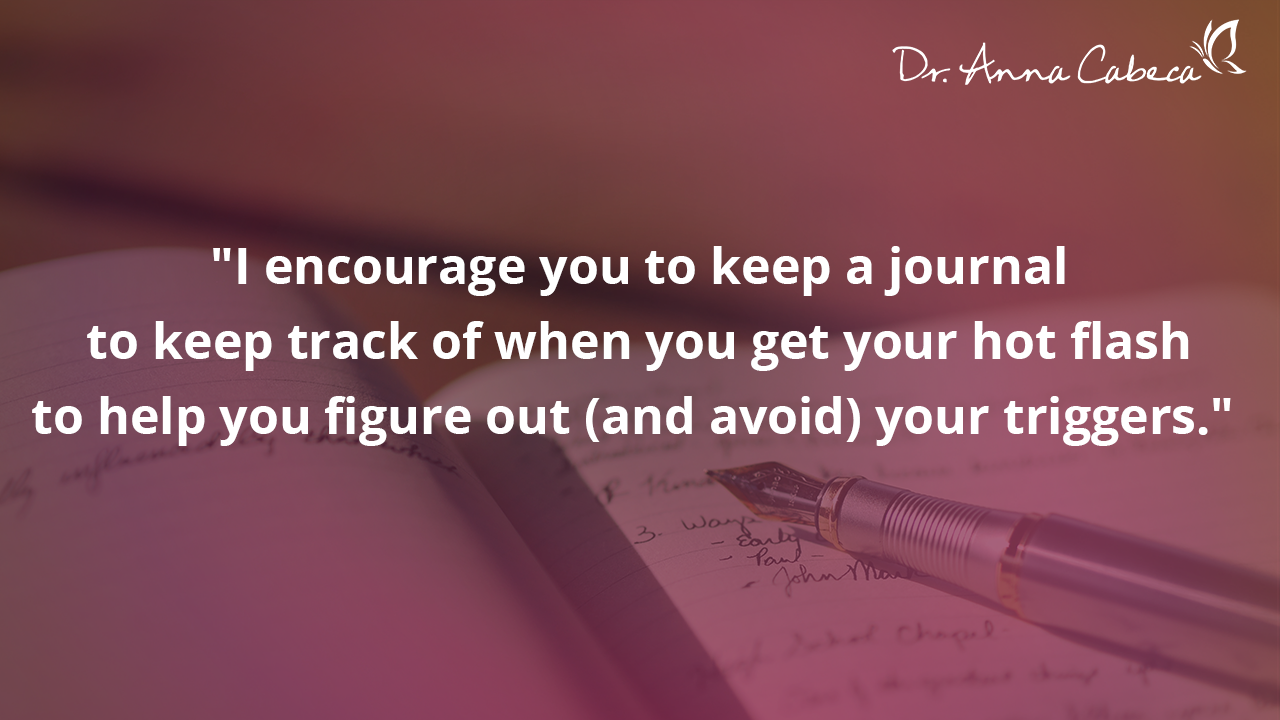
I encourage you to keep a journal to keep track of when you get your hot flashes to help you figure out (and avoid) your triggers. It’s not always easy to just “avoid your triggers”, but it’s still good to know what they are so you can perhaps minimize them in some way.
How Can I Prevent Hot Flashes?
The most common treatment for hot flashes is estrogen-based hormone replacement therapy (HRT).
The issue with HRT is that the added estrogen circulates throughout the bloodstream, so it is not recommended for women having breast cancer and is also not recommended for other specific health conditions such as a history of blood clots or cardiovascular disease.
Always talk to your doctor to be sure what is right for you. I also encourage you to explore all your treatment options, especially more holistic, natural options.
Get your stress levels under control. Easier said than done, I know (I'm a single mother of 4 girls!). But think of it this way, if you do have better stress management, it not only affects how you experience menopause but also reduces your risk of other stress-induced health problems like cardiovascular problems.
Some stress management techniques:
- Deep abdominal breathing exercises
- Meditation and mindfulness
- Being out in nature as much as possible (long walks work wonders)
- Regular movement and exercise (but be careful because getting too hot during workouts can sometimes also trigger hot flashes, so find your balance)
- Release oxytocin — the hormone responsible for love and bonding — by bonding with loved ones, touch, cuddles and more.
- Keeping a journal
- Better time management skills
Of course, you also want to avoid doing things that trigger your hot flashes. I hope you take the time to figure out your triggers! In general, I ask my patients to make lifestyle changes that not only minimize hot flashes but also benefits them on the whole.
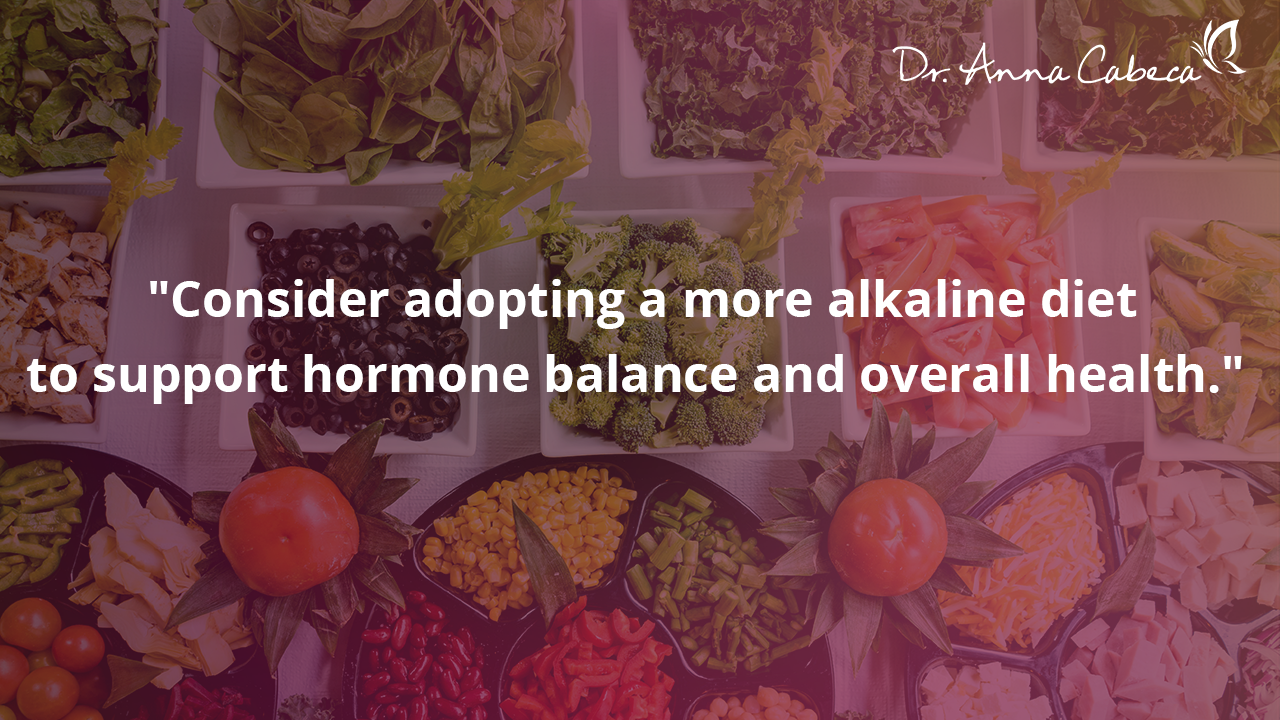
Lifestyle changes you can make:
- Avoid trigger foods like caffeine, alcohol, spicy foods, dairy and hot beverages
- Dress in layers so it is easy to peel off and put on clothes as and when you need it
- Keep yourself cool in general
- Consider eating a more alkaline diet to support hormone balance and overall health
- Carry a portable fan if you have to
- Avoid smoking
- Try and maintain a healthy weight (and this can vary from person to person)
 Let’s Go On An Adventure
Let’s Go On An Adventure
At the end of the day, hot flashes are a part of the female experience. It is a symptom of menopause as our wonderful bodies prepare us for the next stage of our lives. Yes, it sucks that we sometimes have to suffer but let me end with one of my favorite quotes that I found to be helpful in my life.
“New beginnings are often disguised as painful endings.” – Lao Tzu.
I hope that this FAQ session has helped you on your menopause journey (let me know in the comments!). Now that you have all the info, your next BIG question might be, “how to prevent or lessen the effects of a hot flash naturally?”
That is a topic for a different article — one that I will be publishing soon on my blog. It is such a deep topic and I want to make sure I cover all of it for you, so you have the best information available.
Till then, take care of yourselves ladies!
 Let’s Go On An Adventure
Let’s Go On An Adventure
